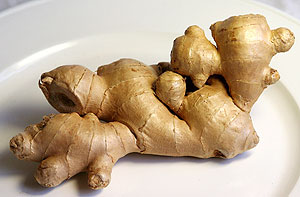Ginger is a perennial plant, distinguished by the white and yellowish-greenish flowers it produces, as well as its thick and long twisting stem. The ginger plant is cultivated in many parts of the world. The plant is famous for its concentrated, spicy aroma, which can be attributed to the fact that it is composed of up to 3% natural essential oils.


Ginger is a perennial plant, distinguished by the white and yellowish-greenish flowers it produces, as well as its thick and long twisting stem. The ginger plant is cultivated in many parts of the world.
The plant is famous for its concentrated, spicy aroma, which can be attributed to the fact that it is composed of up to 3% natural essential oils. Unlike most spices, the part that has the most medicinal value grows underground.
Often mistakenly called ginger root this is actually the rhizome of the plant which is more of a subterranean stem than a root.
The stem is the part of the plant which is generally sold and used today. It has been made widely available for eating and for the use of flavoring foods. It is also ground up and processed into all sorts of powders, tinctures, crystals, tonics and flavorings and then marketed in health food stores.
Looking at the health benefits of Ginger plant. The popular plant contributes various health benefits to our body. Ginger has carminative properties (anti-spasmic) and can be used to calm an upset stomach, providing relief for bloating and gas.
The intake of ginger helps stimulate the secretion of mucus, quieting your cough and soothing any scratchiness in your throat.
Ginger, has been proven (in multiple studies) to treat feelings of nausea, particularly in the form of seasickness, morning sickness, motion sickness and as a side effect of chemotherapy.
Ginger contains anti viral, anti toxic, and anti fungus properties, and is used for the prevention of and treatment against the common cold.
Ginger acts as an antihistamine and aids in the treatment of allergies. Ginger, displays anti inflammatory properties and can be used to treat rheumatoid arthritis, osteoarthritis, and various other muscular disorders. The chemical components of the root are instrumental in inhibiting the biosynthesis of prostaglandins, which are responsible for causing inflammation.
Thus the root has proven to be a highly effective form of treatment than the use of non-steroid inflammatory drugs (NSAID) that are traditionally prescribed.
Ginger contains special enzymes responsible for catalyzing the proteins in our food, thus aiding in digestion and the prevention of cramps. Due to its promotion of mucus secretion, ginger protects against the development of ulcers, unwanted holes in the lining of your stomach.
Ginger has been proven to help lower cholesterol levels and prevent the formation of blood clots.
Ginger is often used to calman upset stomach or treat severe stomach ailments such as dyspepsia or colic. It is frequently used today in developing countries to treat diarrhea.
Although you can use dried ginger and powdered ginger for health benefits, fresh ginger is preferred. It is readily available in most supermarkets. Pieces of the rhizome (stem) can be sliced off for use and the remainder, stored in the refrigerator where it should be kept for about 3 weeks as long as it is not fully peeled.
One of ginger’s most touted health benefits is its ameliorating effects on digestive ailments. It can help digest fatty foods and break down proteins. It is excellent for reducing gas. Many people report that it will also relieve nausea, and can be effective in treating morning sickness as well as motion sickness.
Ginger can also help reduce inflammation. So it can be used to treat any disease that is caused by inflammations such as arthritis or ulcerative colitis. Some studies show that it can even help inhibit the replication of the herpes simplex virus.
Being a warming herb, ginger can help knock out a fever. This property also makes it effective in stimulating circulation of the blood. It can also help relax muscles around the blood vessels and is said to help prevent blood clots from forming.
The warming effects make it a natural decongestant as well as an antihistamine, making it the perfect remedy for colds.
Ends


